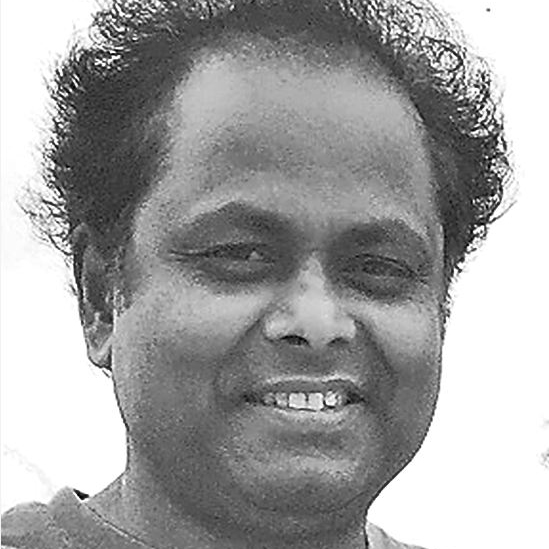Opinion
Looking beyond the horizon
Politicians are more focused on maintaining power than on principles of justice and structural equality
Pramod Mishra
I may come from the land of mountains, but oceans have held an equal, if not greater, fascination for me. Raised in the eastern Nepali plains, I grew up with the Kanchenjunga mountain standing tall to the north. My fascination doesn’t stop at oceans though, as even flowing bodies of water like the Ganges or the Mississippi—on whose banks I have lived for a number of years at different times—or standing bodies of water like the pond in my backyard and the mighty Lake Michigan enthral me. I am grateful that I have lived near either small or big ponds; I owned a small pond near my home in Nepal, and in the United States, I live a mere 30 miles away from Lake Michigan. The mountains and oceans, along with large rivers and lakes, always produce a sense of the sublime in me. As I write this column on the Carolina coast facing the endless horizon of the ocean, I feel the same mixture of awe and terror I used to feel during my childhood while gazing at the vast Himalayan mountain range and its golden and silver tips. The roar of the ocean gives me the same sense of the immeasurable scale of nature that the silent peak of Kanchenjunga gave me in Nepal.
Obstructed vision
Human pettiness appears insignificant before the vastness of the oceans and the mountains. Yet the sublimity of the Nepali mountains doesn’t seem to have affected the emotional and mental mind-frame of many Nepali politicians as it has affected me. The secretive way they drafted the constitution and the hasty way they rushed it through the Constituent Assembly by fiat just because they garnered enough votes in the Second Constituent Assembly and could wield the whip, all showed that instead of broadening their intellectual horizons and deepening their emotional level, their vision was further narrowed. Nepali politicians are more focused on maintaining the power of their own castes and ethnicities than on broader principles of justice and structural equality. For them, these majestic mountains have turned into vision-obstructing hills.
Have the mountains turn into mere hills that raise one barrier after another, impeding visions of the horizon? What did the eternal mountains—some of the tallest in the world—teach these politicians? We should remember that these same mountains taught Prince Siddhartha Gautama a very different lesson twenty five hundred years ago. But twenty five hundred years later, these politicians can’t see the mountains. Instead, they see only the hills from where they came, whose serial barriers obstruct their vision and limit their thoughts.
These politicians have taken the three key concepts of republican Nepal—nationality (rashtriyata), inclusion (samabesita) and development (bikash) and turned them into narrow, mechanical entities. Rather than politically empowering the various ethnicities via inclusion of their language and culture, thus building strong national identities, politicians have externalised ethnicities instead. Pushed by KP Oli’s CPN-UML, anti-India sentiments have become the go-to definition for nationality and this definition has found quite a few supporters. The CPN-UML’s definition has sold well indeed. The CPN-UML brag about their sweeping wins in the local elections, going so far as to boast about their impending success even in Province 2.
Rise of tokenism
After the people’s movement in 2006, inclusion became everyone’s mantra. The marginalised demanded their share of the pie and the establishment adopted the agenda of inclusion amidst much noise. However, the latter reduced inclusion to tokenism. “What more do you want”, they said, “than having both a president and vice president from the Madhesi community?” For them, inclusion became an employment agency for the elite among the marginalised. The rhetoric of politicians can be summarised as such: “We gave so and so from your community this and that position—why are you complaining now?”
Another thing to consider is a word that is much bandied about: Development. Development is the slogan of modernising forces. Development means bringing modernity to the pre-modern, be it by improving roads, electricity production and provision, or industrialisation. In addition, cultural and structural empowerment is necessary for the sustainable economic empowerment of the common person. Without cultural and structural empowerment, economic empowerment could prove to be a mirage that could disappear.
The inspiring mountains have become hills that obstruct the horizon. And the lofty concepts of nationality, inclusion and development have turned into mere lip service. Regressive politicians like KP Oli have run away with their definition of these concepts.
Nepal now faces the challenge of breaking the monopoly of regressive politicians when defining these hot-button concepts; counter definitions and counter narratives should be offered. It is time to look beyond the hills and look to the mountains and the oceans for sublime inspiration. The war on discourse needs to be won before the real battle of politics on the ground can make any progress. Those parties and groups that can recapture words will recapture power. Let’s see who is able to do so. Let’s see if the mountains can once again assert their vision over the hills. Nepal’s future depends on it.
@khardobad




 9.89°C Kathmandu
9.89°C Kathmandu










